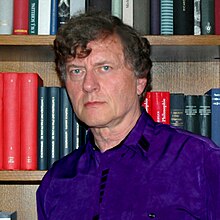Jürgen Höpfner
Jürgen Höpfner (born April 23, 1943 in Erfurt ) is a German writer.
Life
Jürgen Höpfner, son of an officer, was born in Erfurt. Shortly before the end of the war, the family was bombed out and only survived by chance. From 1958 Höpfner attended today's Theodor-Fontane-Gymnasium in Strausberg. Together with other young people, including Michael Gartenschläger , who was shot by an MfS commando while dismantling self-shot systems in 1976 on the inner-German border, he formed a " Ted Herold Schlager Club". In protest against the construction of the Wall on August 13, 1961, the young people wrote slogans on barn walls and finally set fire to a field barn. Höpfner was on vacation longer than planned and therefore not involved. When he returned, a few hours before the group was arrested, he learned of their actions. In a three-day show trial in the culture hall of the Ministry of National Defense in Strausberg, 17-year-old schoolchildren were sentenced to life imprisonment because, as the public prosecutor Klühsendorf explained, he could only apply for the death penalty from eighteen. The 18-year-old Jürgen Höpfner was sentenced to six years in prison for complicity and a literary finger exercise, which was reinterpreted by the former member of the National Socialist Judges Association, District Court Director Walter Ziegler , as an act of violence and propaganda and agitation that was dangerous to the state . (Three months later the same prosecutor-judge duo sentenced the farm worker Walter Praedel to death for the same offenses and died under the guillotine.) Höpfner processed his experience at the time in the story "Farewell to a Butterfly" in the book "Farewell to a Butterfly" in Nazi Germany. Carnival in Bio-Bio ”. He described the judgment as his "GDR Literature Prize". Released from Brandenburg prison after three years, he initially made his way in East Berlin as a warehouse worker, waiter and salesman. Since he was denied a degree, he attended lectures in biology and psychology at the Humboldt University with his wife's coiffed student ID. He later acquired degrees in distance learning from the University of Rostock, the Technical University of Ilmenau and the Institute for Literature in Leipzig.
Höpfner has been a freelance writer since 1977. In his first novel, "Gleisverwerfung" (Gleisverwerfung), he deals with the prehistory of his process: It was not Western influences that caused the anti-state development of the youth group, but rather youth policy and the restrictive everyday life in the SED state itself. State security accompanied the creation of the manuscript from the beginning: regularly reported to functionaries of the Mitteldeutscher Verlag. Nonetheless, the book was stopped from printing and pulped and only appeared a year later with changes imposed on the author.
In speeches at political events of the Writers' Association, Höpfner criticized the censorship practices and called for freedom of travel not only for writers, but for all citizens. In 1988 he applied for an exit visa. The State Security's decision states: “The people HÖPFNER, Jürgen and his wife KARIN are hostile forces of the political underground, whose relocation should be implemented by April 20, 1988 in coordination with the BL of the SED Berlin for security reasons . "
Works
- The Hell of Fort d Issy Military Publishing House of the GDR, Berlin 1979
- Operación Chanchera Militärverlag Berlin 1979 (under pseudonym: Knut Velhagen)
- Track faults at Mitteldeutscher Verlag, Halle Leipzig 1982
- Dead Tauben Verlag Das Neue Berlin, Berlin 1982
- Carnival in Bio-Bio Mitteldeutscher Verlag, Halle Leipzig 1983
- Doom before Elysium Verlag Das Neue Berlin 1983
Web links
- Literature by and about Jürgen Höpfner in the catalog of the German National Library
- Event flyer 50 years ago: The show trial against the members of the "Ted Herold Fan Club Strausberg" in Strausberg (PDF file)
Individual evidence
- ↑ Joachim Walther: Security area literature. Writer and State Security in the German Democratic Republic; Ch Links Verlag, Berlin 1996, p. 786.
| personal data | |
|---|---|
| SURNAME | Höpfner, Jürgen |
| BRIEF DESCRIPTION | German writer |
| DATE OF BIRTH | April 23, 1943 |
| PLACE OF BIRTH | Erfurt |
